PRINCETON, NJ -- As President Barack Obama prepares to deliver a major address in Cairo on Thursday, aimed in part at rebuilding U.S. credibility with Muslims around the world, a Gallup Poll update shows that 80% of Americans believe that people in Muslim countries have an unfavorable view of the U.S. Only 13% of Americans say such attitudes are positive. These views have changed little over the last seven years.
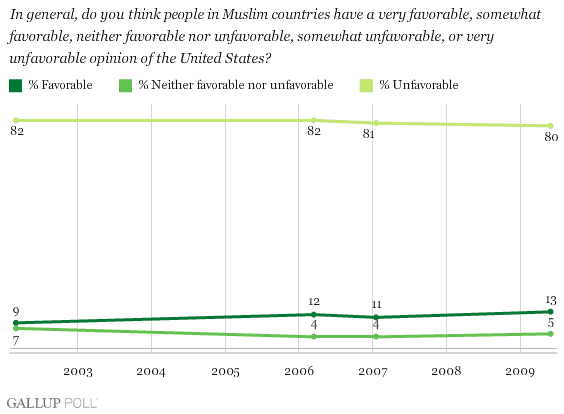
These data suggest that Americans at least understand the basis for Obama's effort at rapprochement with the Arab world through his highly anticipated speech in Egypt.
In March 2002 -- some six months after the Sept. 11 terrorist attacks -- Gallup first asked Americans to speculate on how they believe people in Muslim countries perceive the United States. At that point, 82% of Americans said they believed people in Muslim countries had either a very or a somewhat unfavorable view of the United States. Today, over seven years later, as noted, this number is almost exactly the same. The percentage of Americans who say residents of Muslim countries have a very or somewhat favorable opinion of the U.S. has crept up marginally, from 9% in 2002 to 13% today.
Americans continue to ascribe much of this negativity toward the U.S. -- as they have to varying degrees since 2002 -- on misinformation from the media and the governments of Muslim countries, rather than on what the U.S. has done. Given this, the American public would probably welcome any effort by Obama in Cairo to correct distortions about the United States that have been perpetuated in the Muslim world.
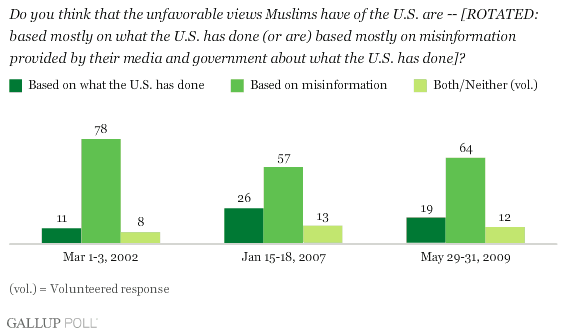
Americans' Views of Muslim Countries
Almost 4 in 10 Americans say they personally have an unfavorable view of Muslim countries -- about half the number who say people in Muslim countries have an unfavorable view of the U.S.
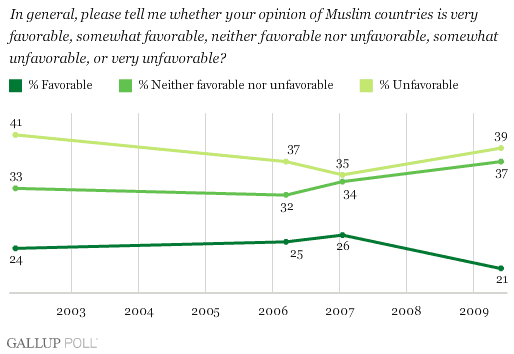
In addition to the 39% of Americans who have an unfavorable opinion of Muslim countries, 21% say their attitudes toward Muslim countries are favorable, and another 37% say their opinions are neutral (neither favorable nor unfavorable).
The March 2002 reading on American attitudes toward Muslim countries showed much the same pattern as today, with 41% unfavorable, 24% favorable, and 33% neutral. Updates in 2006 and 2007 showed unfavorable/favorable attitudes toward Muslim countries registering 37%/25% and 35%/26%, respectively.
Americans' Knowledge About Muslims
Unlike the relatively static trends in Americans' basic views of Muslim countries and what Muslim people think about the U.S., there has been an increase over time in Americans' professed knowledge about the opinions and beliefs of people who live in Muslim countries.
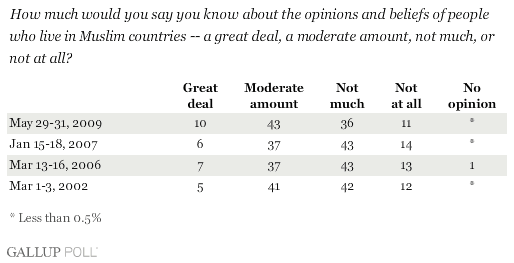
Today, a majority of Americans, 53%, say they know a great deal (10%) or a moderate amount (43%) about the opinions and beliefs of people in Muslim countries, compared with 46% in 2002, 44% in 2006, and 43% in 2007. Those who claim to know the most ("a great deal") about people in Muslim countries don't appear to be significantly different from the rest in terms of the positive or negative tilt of their views; however, those in the self-identified knowledgeable group are both more positive and more negative in their views compared to those with less knowledge. The latter group (including those with moderate knowledge and those with little or no knowledge) is more likely to say their opinions are neither favorable nor unfavorable.
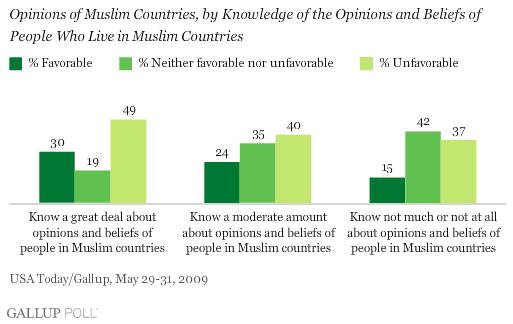
Implications
The data reviewed here indicate that Americans still believe there are serious problems in the relationship between Muslims around the world and the U.S. There has been an uptick in Americans' claimed knowledge about Muslims, but the data show few signs that Americans have become more positive about Muslim countries, or that Americans believe that people living in Muslim countries have become more positive about the U.S. The vast majority of Americans still think people living in Muslim countries have negative views of the United States.
Thus, these data would suggest that Americans most probably see a clear need for Obama's speech in Cairo on Thursday, to the degree that the speech -- and perhaps any policy changes that may be announced as part of the speech -- enhances the credibility of the United States among Muslims, and enhances understanding between the Muslim and Western worlds.
Survey Methods
Results are based on telephone interviews with 1,015 national adults, aged 18 and older, conducted May 29-31, 2009. For results based on the total sample of national adults, one can say with 95% confidence that the maximum margin of sampling error is ±3 percentage points.
Interviews are conducted with respondents on land-line telephones (for respondents with a land-line telephone) and cellular phones (for respondents who are cell-phone only).
In addition to sampling error, question wording and practical difficulties in conducting surveys can introduce error or bias into the findings of public opinion polls.
